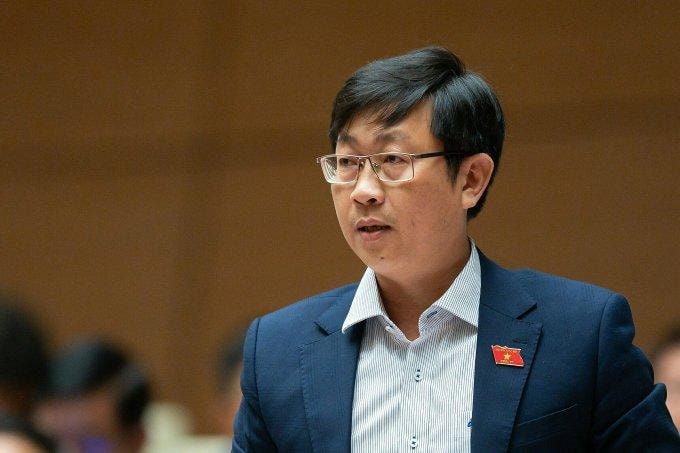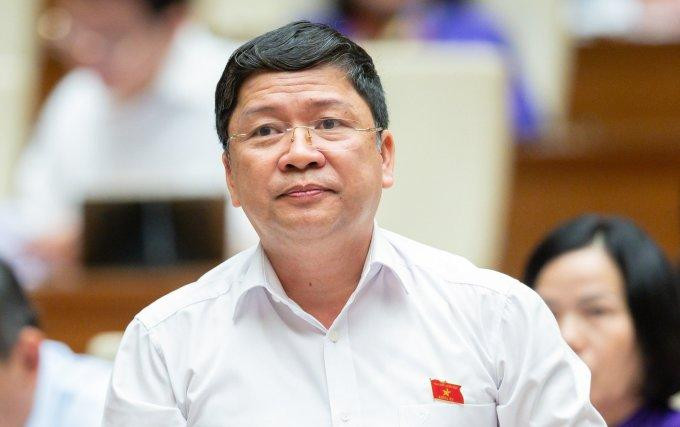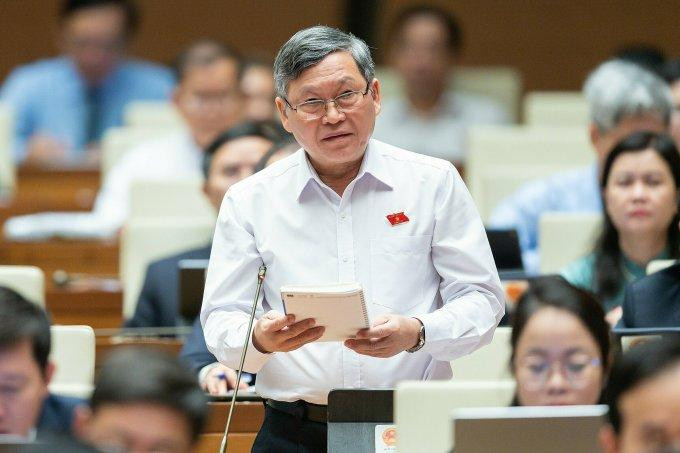'Officials would rather stand before a disciplinary board than a trial board'
According to delegate Nguyen Huu Thong, a number of cadres, civil servants, and public employees, including managers, are feeling insecure, afraid of making mistakes, afraid of responsibility, and are working half-heartedly.
On the morning of October 27, discussing socio-economic issues at the National Assembly, delegate Nguyen Huu Thong (Deputy Head of the delegation of Binh Thuan province) said that an official once confided to him that "it is better to stand before a disciplinary council than stand before a trial council".
The reason for this situation is the lack of synchronization of the legal system. For the same problem, when applying this law to implement it is correct, but when inspecting, checking, auditing, investigating, applying another law is wrong. At this time it may be correct, but when checking at another time it is wrong.
According to Mr. Thong, the most easily erroneous issue is determining land prices. According to current regulations, determining land prices is almost entirely based on assumptions, so it is difficult to ensure accuracy. Finance Minister Ho Duc Phoc also said that the current method of determining land prices is inaccurate and needs to be revised. Meanwhile, many localities have large projects but have not yet determined land prices for investment implementation. "If the Government cannot resolve this issue, it will be difficult to achieve the 2023 growth target," Mr. Thong said.
The second reason that makes cadres feel insecure, afraid of mistakes, afraid of responsibility, according to the delegate from Binh Thuan, is that although the Politburo has issued a conclusion on the mechanism to protect cadres who dare to think, dare to do, dare to break through for the common good, this correct policy has not been specified in legal documents. Cadres only do it half-heartedly, not daring to break through. Therefore, Mr. Thong suggested that ministries and branches regularly review mechanisms and policies to adjust them to be consistent and close to reality.
 |
Delegate Nguyen Huu Thong. Photo:Hoang Phong |
Debate with delegate Nguyen Huu Thong, Vice Chairman of the Committee for Culture and Education Ta Van Ha said that officials and civil servants shirking and avoiding responsibility greatly affects the performance of their duties to serve the people. However, if only stating the cause due to legal problems is not enough, but "the main cause is people, the organization and implementation, especially the responsibility of the leader".
According to Mr. Ha, there are three cases where officials do not dare to do things. First, officials with limited capacity are afraid of making mistakes. Second, officials with capacity but limited awareness and spirit, so they just listen and avoid. Third, there is a group of officials who are afraid that doing things will cause problems because they do not match the instructions of their predecessors.
"I wonder why the Land Law and the Bidding Law were both issued in 2013, but there were not many problems before like now? Some people frankly say that in the past they did things carelessly, incorrectly, and irresponsibly, so if they do things correctly now, problems will arise, so they just do things half-heartedly and avoid them," said Mr. Ha.
The Vice Chairman of the Committee for Culture and Education proposed that the Government have solutions to address the above situation, but the Prime Minister directed strongly, held meetings day and night, but at the bottom there was a moderate mindset.
 |
Vice Chairman of the Committee for Culture and Education Ta Van Ha. Photo:Hoang Phong |
Resignation of civil servants raises demands for improved governance
Concerned about the situation of nearly 40,000 cadres, civil servants and public employees quitting their jobs in the past 2.5 years, delegate To Van Tam (Standing member of the Law Committee) said that this issue is an opportunity for the Government to evaluate and improve its governance activities.
According to Mr. Tam, the trend of officials leaving the public sector for the private sector is not only in Vietnam but also in many other Asian countries such as Korea and Japan. These people, when moving to the private sector, still contribute to the country and society. The reason for their move is because the public sector's salary is low, often reacting slowly and late to the practical demand for increased income due to legal constraints. Many people also leave the public sector because of too much work pressure, or prioritize self-development over staying in one place.
"Both the public and private sectors require knowledge, responsibility, dynamism, creativity, and efficiency. But the public sector also requires responsibility to the people, so income needs to be balanced so that officials can serve the people," said Mr. Tam.
Delegates of Kon Tum provinceGovernment proposalImplement a working style that is clearly decentralized according to administrative hierarchy. The issue of staffing and organizational structure needs to be reasonable; supplement the mechanism for handling work, working environment, dedication, and promotion opportunities in a fair and transparent manner.
In addition, the Government must also perfect the regulations on the system of civil servant and public employee recruitment exams and the selection of managers. The income of civil servants and public employees must be given due attention, with an appropriate and flexible salary mechanism based on the value of labor, knowledge and work efficiency. The mechanism to protect cadres who dare to think and dare to do must be legalized.
 |
Delegate To Van Tam. Photo:Hoang Phong |
Delegate Huynh Thanh Phuong (Secretary of Go Dau District Party Committee, Tay Ninh Province) reflected on the current difficult living conditions of workers, officials, civil servants, and armed forces, especially at the grassroots level. The reason is that since July 2019, the basic salary has not been increased, while the consumer price index has increased by 4% every year, causing real wages and living standards to decrease accordingly. "This is also the reason for the shift of highly skilled workers, officials, and civil servants from the public to the private sector," he said.
To overcome this, Mr. Phuong suggested promoting decentralization and delegation of power combined with inspection and supervision to create dynamism, creativity, daring to think, daring to do, and daring to take responsibility for cadres and civil servants across the country.
The National Assembly will discuss the socio-economic situation at Dien Hong Hall for two days (October 27 and 28).
